Powering Innovation and Translational Science with OCTRI Informatics

Mission and goals
OCTRI Informatics accelerates translational research by providing a full suite of informatics tools for bench-to-bedside, clinical, and health care systems research. The program achieves its objectives by:
-
Helping researchers leverage EHR/Epic data for studies.
-
Developing software and customized databases for clinical research data collection and management.
-
Assisting researchers with the storage, retrieval, sharing, and optimal use of biomedical information, data, and knowledge.
We encourage you to meet with program staff early in the study planning stage to ensure an appropriate solution design and budget. Please submit a request for an informatics consultation.
For more information on this program's mission and goals, please review the OCTRI Informatics Strategy document.
Innovation Core: Custom applications and research repositories to meet complex needs
The OCTRI Informatics Innovation Core supports a diverse population of investigators and projects using an array of innovative technologies. We have the staff and expertise to create and maintain sophisticated software applications and databases. Review our services below.
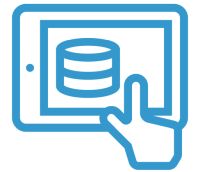
We can develop applications to support participant interventions, either for recruitment, participant-reported outcomes, or other purposes.
These interventions provide participants with the tools to participate in your study either by collecting responses or sharing important details regarding the study.
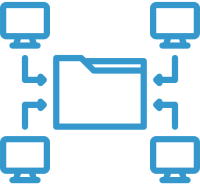
Hosting data in a research repository can serve as a source of truth for published results and provide insights into the study population through reports and exploration.
Access controls can be used to ensure that only your team can log in, with roles and permissions controlling what each member can see and do.
Repositories can be populated with data from the EHR and regularly updated as new encounters occur in Epic.
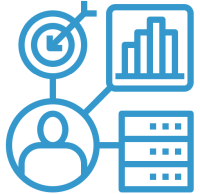
The Innovation Core can create a custom application to ease the burden on study staff managing clinical research data.
A web interface allows for quick browsing and entry of data, and custom imports can be created to bring spreadsheets into a structured and auditable format with security and regular backups built in.
These systems can also integrate with other resources like the Research Data Warehouse to pull in demographics, labs, and genomics data automatically or data pipelines in R or Python to perform analysis or build reports.
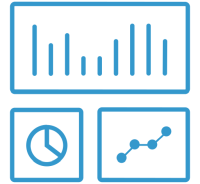
Visualizing your data often reveals important insights that may not be immediately obvious. We will work with you to structure and visualize your data.
Read more about data dashboards here or see project spotlight below on a project with an OHSU faculty member.

If your study requires an application to support either the data collection or exploration of a domain, we can deliver a custom solution that meets OHSU regulatory and security guidelines.
Working with the Innovation Core
Our team works in an agile development environment, collaborating closely with you to design the best solution for your project. We have expertise in navigating OHSU regulatory and security requirements. We can also provide an estimate to support your grant application, including longer term collaborations funded by FTE on a grant.
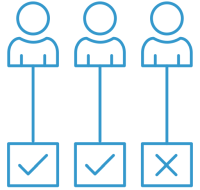
-
User roles and permissions
-
Integrations with other systems, including FHIR applications
-
User controlled managed content
-
Reporting functionality
-
HIPAA compliance and IRB expiration monitoring
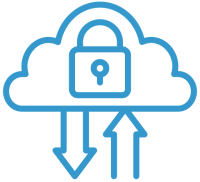
-
Hosting/Maintenance
-
Secure coding practices
-
Authentication/Security*
-
Auditing*
(*) required by OHSU
Innovation Core Project Spotlight
Health of Oregon Adults with Disabilities - Medicaid Data
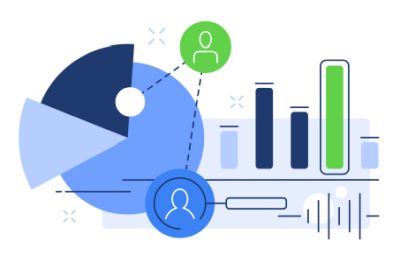
The Innovation Core built a dashboard for the OHSU University Center for Excellence in Developmental Disabilities to visualize Medicaid claims data about the health of individuals with intellectual and developmental disabilities in Oregon. The goal of the project is to identify and close policy gaps to improve the health and quality of life of individuals with disabilities.
Review the full story and dashboard examples in the Project Spotlight Summary
Research Data Warehouse: Using Epic® data for research purposes
OCTRI maintains a repository of Epic data from patients and research subjects. This valuable resource, called the Research Data Warehouse (RDW), provides access to over 2.5 million patient records with 20 million patient encounter records and more than 40,000 data points. OCTRI staff can act as your guide through this complex data, or you can query the data yourself with the Cohort Discovery Tool.
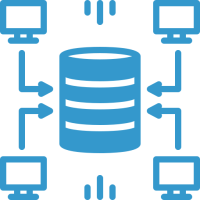
You can use the RDW for a broad range of research purposes, including:
- Cohort discovery (counters) for preparation to research purposes
- Deidentified data sets for epidemiological studies
- Data sets that identify potential study participants or gather retrospective data on current participants
- Automated data marts and/or data feeds that provide up-to-date population demographics for individual research projects
- Natural language processing applications for electronic health record notes
| Data Type | RDW Count | OMOP Count* |
|---|---|---|
| Total patients | 4M | 3.9M |
| Inpatient encounters | 285K | 406K |
| Emergency encounters | 627K | 614K |
| Outpatient encounters | 107M | 80.5M |
| Lab results | 340M | 209M |
| Microbiology | 3.5M | NA |
| Medication results | 69M | 76M |
| Total diagnoses | 206M | 84M |
| Total procedures | 243M | 127M |
*More on OMOP below

To reach the RDW team, please complete the OCTRI Resource Request Form or email: octri@ohsu.edu
Cohort Discovery Tool
Cohort Discovery is a web-based tool that allows OHSU researchers to discover patient cohort counts from RDW-based Epic data for preparatory to research purposes.
If you are interested in using Cohort Discovery, please reach out to octri@ohsu.edu to schedule a brief training.

Researchers can use this tool to:
- Assess the feasibility of a study
- Identify patients meeting inclusion/exclusion criteria
- Begin study planning prior to submission to the Institutional Review Board
The data is deidentified, but patient data sets can be extracted from saved searches with proper Institutional Review Board approval.
Searchable taxonomies include demographics, diagnoses, medications, procedures, laboratory results, surgeries, patient visits, and vital signs.
Natural Language Processing applications
The RDW leverages an OMOP data repository to access extensive electronic health record notes for usage in Natural Language Processing (NLP) applications.
The OMOP repository has both the raw note text, as well as data structures for NLP artifacts. Implemented note types include:
-
Progress notes
-
Discharge Summaries
-
ED notes
-
H&P
-
Op Note
-
Procedures
-
EEG Reports
-
Solid tumor pathology reports
-
Hematopathology reports
-
Radiology reports (X-ray, CT scan, MRI scan readings)
The Observational Medical Outcomes Partnership (OMOP) Common Data Model (CDM) is an open community data standard, designed to standardize the structure and content of observational data and to enable efficient analyses that can produce reliable evidence (OHDSI.org). We have implemented the OMOP CDM at OHSU and provide access to its de-identified data for research uses. We are in the process of implementing software tools to allow access to the data, perform analysis, and generate visualizations.
Recent enhancements have included augmenting the data with social determinants of health data, demographic data (REALD), and other valuable data sets.
Partner with OCTRI on clinical research data initiatives
OCTRI Informatics and the OHSU Knight Cancer Institute have formal collaborations around clinical research data enhancement and natural language processing that leverage the RDW, as well as expertise and strengths within each institute. Read more about the OCTRI-Knight partnership below.
If you are interested in developing a partnership similar to the one with the Knight Cancer Institute for your center, department, or division, then please contact Dr. Mohammad Adibuzzaman, co-Director of OCTRI Informatics: adibuzza@ohsu.edu
Knight Data Enhancement Pilot 2019
OCTRI Informatics and the OHSU Knight Cancer Institute launched a Knight Data Enhancement Pilot in July of 2019. The premise for this pilot was to:
- Ensure data from the RDW were available to IRB approved protocols in a timely and accurate fashion
- Provide dedicated analyst support to assist in discovery of additional data elements needed for Knight clinical and translational research
- Improve efficiency for data curators by use of data feeds and support from natural language processing (NLP)
- Maximize the use of the OHSU Research Data Warehouse to support the mission of the Knight Cancer Institute
The initial focus was to automate manual data pulls from the RDW into the Knight Data Management system (Knight DMS). The use case for the pilot was the Serial Measurements of Molecular and Architectural Responses to Therapy (SMMART), the flagship project of the Knight Cancer Institute’s precision oncology program. This was done by the Knight funding 2 FTE in the OHSU Research Data Warehouse Team to provide data engineering and analyst support for Knight Data Operations. The pilot proved to be cost effective, allowed scaling and reduced errors. This automated 9 previously manual data feeds, as well as creating 3 new automated data pulls, given the dedicated analyst support.
Knight Data Enhancement Program 2020
Based on this early success, the Knight Data Enhancement Program (DEP) was formed in January 2020 as part of the Knight Strategic planning computational roadmap, co-lead by Dr. Shannon McWeeney, Chief Data Officer for the Knight. This program actively supports SMMART, Brenden-Colson Center for Pancreatic Care , BeatAML, and other key Knight Cancer Institute programs and efforts. It was critical for the Cancer Covid-19 Consortium during the height of the pandemic. Overall, the DEP and its integration with Knight DMS has led to a 5X increase in efficiency for incorporating new data elements/feeds. In addition, the Knight leverages its partnership with OCTRI NLP for unstructured data.
For Knight investigators wishing to learn more about Knight DEP, please contact Dr. Christina Zheng, Director of Knight Data Operations: zheng@ohsu.edu.
RDW Project Spotlights
Opioid treatment
Customized database of patients with opioid use disorder to identify potential treatments
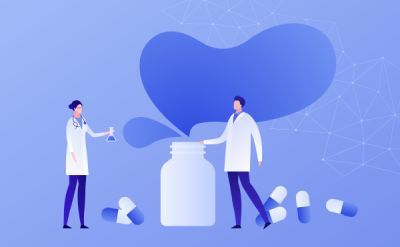
The OCTRI RDW team collaborated with Dr. Ryan Cook, OHSU additiction medicine expert, to build a database of 10,000+ patients with opioid use disorder containing information on medical services, lab tests, medications, hospital stays, clinical notes, social determinants of health, and more.
This database will be used to identify which interventions may most effectively reduce drug use and promote engagement in substance use disorder care.
Read the full story in the Project Spotlight Summary.
Maternal health
Customized dataset for study of postpartum maternal health
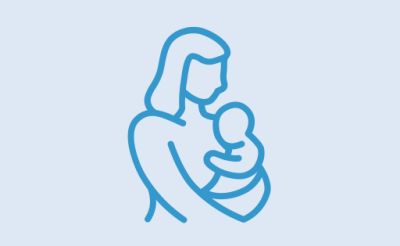
The OCTRI RDW team helped DMICE faculty, Dr. Nicole Weiskopf, and her trainee, Ayo Babatunde, an OHSU researcher assess data requirements necessary to answer research questions related to maternal health during the postpartum period and supported the data extraction process.
This data set will be used for a retrospective study to identify and understand threats to validity when studying maternal morbidity.
Read the full story in the Project Spotlight Summary.
Leadership and Teams

Mohammad (Adib) Adibuzzaman, PhD (he/him)
Director, Informatics
adibuzza@ohsu.edu

Dan Bendelic (he/him)
Program Manager
bendelic@ohsu.edu

Izabelle Humes (she/her)
Senior Research Project Manager
humes@ohsu.edu

Danny Wilmer (he/him)
Informatics Project Coordinator
wilmer@ohsu.edu

Erik Benton (he/him)
Research Engineer, Sr / Technical Lead
benton@ohsu.edu

Rumel Mahmood
Research Engineer, Sr
mahmoodr@ohsu.edu

Imogen Bentley (they/them)
Systems and Applications Analyst

Heath Harrelson (he/him)
Research Engineer

Matthew Lawhead (he/him)
Research Engineer, Sr

Vijet Muley, MS (he/him)
Research Engineer

Amy Yates (she/her)
Research Engineer
OCTRI

Jiro Inoue
Research Engineer, Sr / RDW Analyst Lead
inouej@ohsu.edu

Alina van Lunteren, MPH (she/her)
Research Data Warehouse Analyst

Tim Kilgore (he/him)
Research Engineer, Sr

Sara Marinucci-Seevers (she/her)
Research Data Warehouse Analyst
OHSU Business Intelligence & Advanced Analytics

Susan Myers (she/her)
Application Engineer, Research Analytics & Big Data

Rodney Payne (he/him)
Application Engineer, Research Analytics & Big Data
OCTRI-Knight Cancer Institute Partnership

David McCoy
Data analyst

Ocean Murff
Application Engineer

Contact an OCTRI Navigator to connect with research resources


Research Data Concierge at OHSU
Get help accessing and working with research data at OHSU.
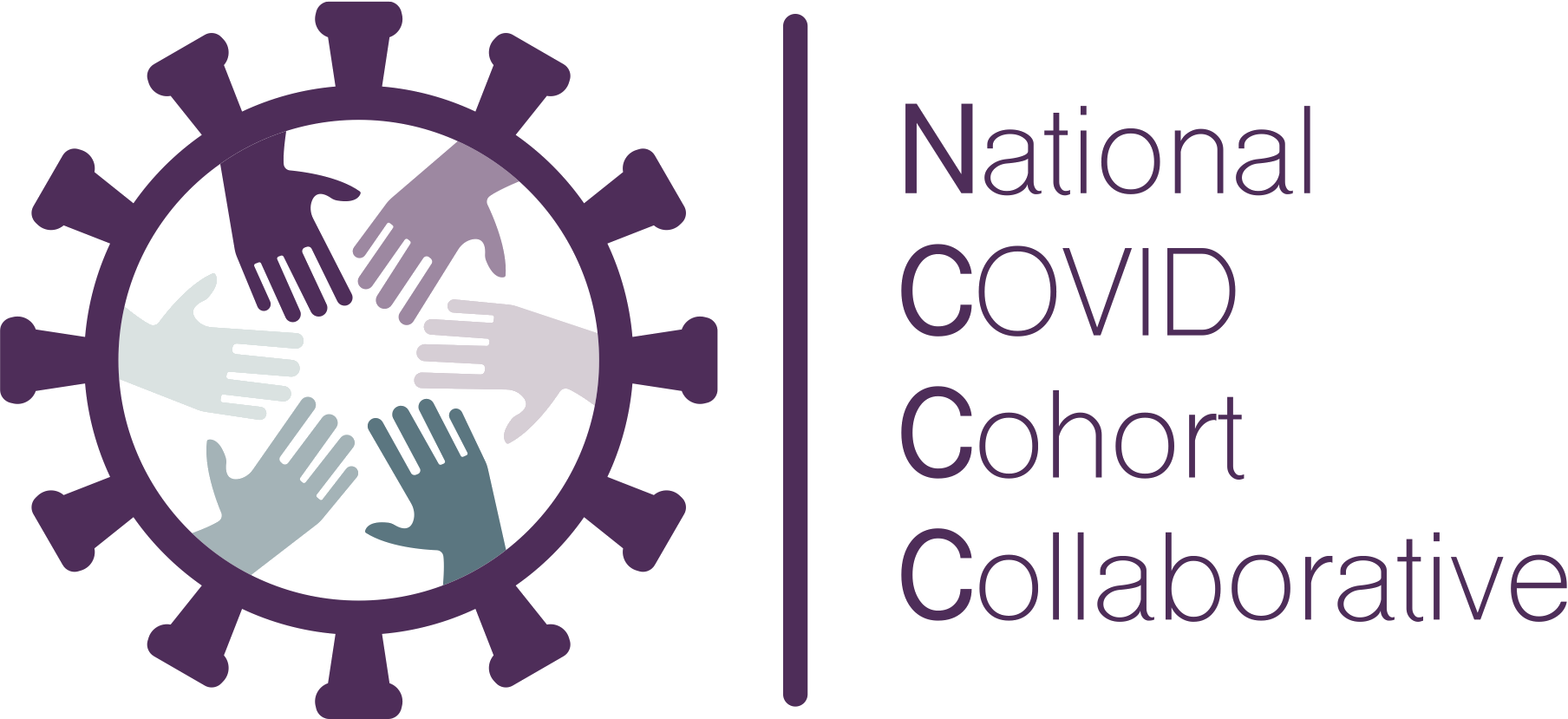
Use de-identified patient data to study COVID-19 and potential treatments.
Epic for Research Team - an OHSU Information Technology Group
Separate from the RDW, researchers can also use Epic directly for research-related activities.
For more information, see the Epic for Research Team’s SharePoint site.
Quick list of OCTRI grant numbers
CTSA award: UL1TR002369
TL1 program: TL1TR002371
KL2 program: KL2TR002370